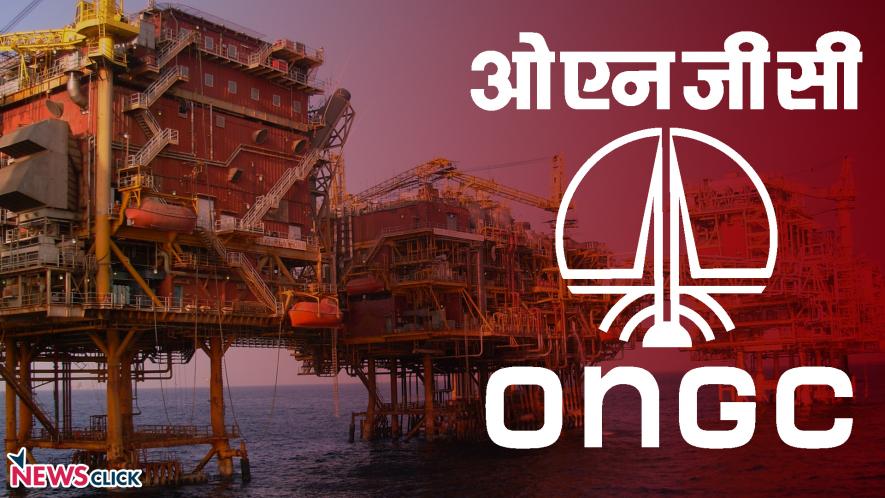ONGC, India’s Most Profitable Public Sector Enterprise, Becomes Target For Privatisation

Newsclick Image by Aman Khatri
A bizarre war of words has broken out between two lobbies over how to go about privatizing the Oil & Natural Gas Corporation (ONGC), India’s most profitable public sector enterprise. One lobby, recommends that government should sell off 60% stake in 11 prime oilfields of ONGC to private companies. This seems to be the government’s own thinking because the proposal was aired by no less than the Directorate General of Hydrocarbons, the regulatory body for oil and natural gas, functioning under the Ministry of Petroleum and Natural Gas.
The other lobby, in response, says why give away these prime fields, instead sell off a 18% of the government stake in ONGC to raise over Rs.41,000 crore at current market prices.
By starting this debate, the real question as to whether ONGC needs to be privatized at all has been pushed aside. Remember: ONGC produces three quarters of India’s crude oil and two thirds of natural gas. It earned a profit of over Rs.20,000 crore and has assets worth Rs.4.12 lakh crore in 2016-17. It employs over 33,000 persons.
But the Modi govt., scrambling to raise resources and committed to please private capital by selling off India’s most valuable publicly owned assets, is now targeting the most lucrative assets of the country. The govt. has already privatized public sector assets worth Rs.1.24 lakh crore during its three and a half years’ tenure, causing loss of jobs and simmering discontent.
The logic given for selling off the 11 fields is that it would bring in private players with “world class technology” which is needed to push up output. However, what this conveniently ignores is that existing privately owned fields are themselves stagnating despite having partnerships with the world’s biggest oil and gas extraction companies. For instance, Reliance Industries (RIL) owned KG-D6 field is reportedly producing a tenth of what it was a decade ago though it has oil major BP as its partner and Cairn India’s Barmer block where output has dropped 4% in 2015-16, according to unnamed senior executive quoted by TOI. These fields are just 8-10 years old.
"By DGH's own admission, technology, etc, can be inducted and the government's objective of raising production can be met without ceding ownership of fields. Why then this stress on privatisation?" another executive asked.
Another official cited the example of Panna/Mukta and Tapti oil and gas fields in western offshore, which was taken away from ONGC in the 1990s and given to Enron Corp and Reliance Industries.
After Enron's bankruptcy, the fields were first operated by BG Group of UK and now under Royal Dutch Shell but the production has only fallen, leading to the partners deciding to relinquish one of the fields, he said.
The 11 ONGC fields suggested for private handover include four of ONGC's biggest assets in Gujarat — Kalol, Ankleshwar, Gandhar and Santhal. Nineteen other fields have been identified for technical partnership with oilfield services companies without ceding ownership, the TOI report said.
It may be recalled that in 1992-93, 28 fields discovered by and belonging to ONGC were privatized using the same argument as today that private companies would be more effective in moving ahead with production.
Strangely, the opposing lobby, quoted though not named by a PTI report of Sunday, laments the sale of these fields “for a song” and says that it would “bleed the PSU to death” even while pressing for privatizing ONGC itself. The solution, according to these votaries is to undertake wholesale privatization rather than targeted selling of oilfields!
"If they think ONGC is inefficient, the company should be privatised. The proposed approach will only drive the company, which is India's most profitable PSU, the Air India way," one of these experts told PTI on condition of anonymity.
Setting the debate agenda in this way, either path would lead to a substantial loss of precious national assets – but the Modi govt., despite its repeated chanting of the nationalist mantra, is happy either way.
Get the latest reports & analysis with people's perspective on Protests, movements & deep analytical videos, discussions of the current affairs in your Telegram app. Subscribe to NewsClick's Telegram channel & get Real-Time updates on stories, as they get published on our website.
























